|
|
|
Sort Order |
|
|
|
Items / Page
|
|
|
|
|
|
|
| Srl | Item |
| 1 |
ID:
160569
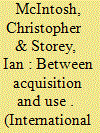

|
|
|
|
|
| Summary/Abstract |
Much of the contemporary literature on nuclear terrorism focuses on the question of whether a terrorist organization could acquire a nuclear weapon. This assumes that once a terrorist group acquires a weapon, they will, at some point, attempt to detonate it in an attack. This article calls that assumption into question by using a strategic perspective to examine the likely behavior of a nuclear-armed terrorist organization. We identify and assess the most likely options available and conclude that a nuclear terrorist attack is the least likely outcome—even for terrorist groups with nuclear capability. This results from three drawbacks of actually detonating a nuclear weapon: the costs associated with an attack, the benefits forfeited in terms of the options foreclosed by using the weapon, and the relative strategic value of alternative courses of action.
|
|
|
|
|
|
|
|
|
|
|
|
|
|
|
|
| 2 |
ID:
160564
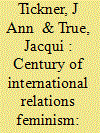

|
|
|
|
|
| Summary/Abstract |
We examine feminism in international relations from the emergence of women's peace pragmatism during WWI to the development of the United Nations (UN) Women, Peace, and Security (WPS) agenda a century later. We argue that feminism did not come late to international relations. Rather, international relations came late to feminism. Moreover, we show how the principles articulated by women peace activists at the 1915 Hague Conference represent distinct contributions to the discipline. These principles reflect a pragmatic approach derived from women's experiences of promoting peace and inclusion. The pragmatism of these principles is echoed by, and further developed in, four pillars of the WPS agenda—as shaped by advocates of women's rights, working through processes of trial and error, to gain state support for advance principles of equal and lasting peace. States may have rejected discussion of women's rights as an appropriate matter for international negotiations in 1915. But with the evolution of women's political rights during the twentieth century, it is now possible to advance a feminist perspective on international peace and security. By recovering neglected aspects of the last century of international relations’ feminism, this article helps further an alternative, pragmatist perspective on ways of knowing and doing international relations.
|
|
|
|
|
|
|
|
|
|
|
|
|
|
|
|
| 3 |
ID:
160567
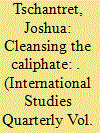

|
|
|
|
|
| Summary/Abstract |
Why do insurgents target certain groups for extermination? Despite a great deal of attention to the targeting of civilian ethnic minorities, comparatively little scholarship exists on insurgent violence against sexual minorities (lesbian, gay, bisexual, or transsexual individuals). This article maintains that the decision to target sexual minorities follows three distinct logics: two strategic and one ideological. First, insurgents face an incentive to outbid rivals by targeting sexual minorities when homophobic violence is politically and socially legitimated. Second, territorial control creates an incentive for insurgents to signal their ability to selectively punish, which they can accomplish through homophobic violence. Third, revolutionary ideologies provide legitimation for exclusionary violence in the pursuit of transforming society. Statistical analysis of insurgent violence against sexual minorities from 1985 to 2015 lends strong support for these arguments. Process tracing of the spread of violence against sexual minorities in Iraq and Syria clarifies the strategic causal mechanisms. When progovernment militias targeted perceived homosexuals with impunity, antigay violence was adopted by insurgent groups seeking to legitimize their claims to power; violence then quickly spread to competing insurgents. Two additional cases from Latin America demonstrate that ideology plays an important role in influencing which groups embrace homophobic violence even under these strategic constraints.
|
|
|
|
|
|
|
|
|
|
|
|
|
|
|
|
| 4 |
ID:
160575
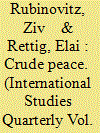

|
|
|
|
|
| Summary/Abstract |
Does trading oil promote peace between rival countries? Despite the optimism of liberal theories on the value of economic interdependence, countries worry more about the possibility of being cut off from vital oil supplies than about forgoing the potential economic gains of trade. The 1979 Israeli-Egyptian peace is an exception to this rule, as the inclusion of oil trade agreements during negotiations succeeded and eventually became a positive aspect of the relations between the two states. However, this resulted not from the promotion of economic interdependence during negotiations, but from its avoidance. The United States guaranteed to compensate Israel for any breach in the oil agreement. This permitted Israel and Egypt to trade freely without imminent concern of becoming too dependent on one another. In consequence, they slowly built mutual trust over the years. Israeli and US declassified documents shed light on the creation of this unique oil trade agreement during the final phase of peace negotiations. We argue that a third-party guarantee to compensate for a breach in energy trade is often a necessary condition for such deals to succeed, provided that the guarantor meets certain preconditions unique to energy trade.
|
|
|
|
|
|
|
|
|
|
|
|
|
|
|
|
| 5 |
ID:
160571


|
|
|
|
|
| Summary/Abstract |
What are the most efficient strategies to prevent military coups d’état? The answer depends on coup agency, that is, who attempts to overthrow the regime: elite officers or lower-ranking combat officers. Elite officers and lower-ranking combat officers have different incentives, opportunities, and capacities when it comes to perpetrating coups. Using original data on coup agency, public spending, and officer salaries in the Middle East and North Africa, we find that counterbalancing—a strategy designed to increase barriers for coup plotters’ coordination efforts—and higher shares of defense spending prove more effective at preventing coups by elite officers. However, higher social spending reduces the risk of coups by combat officers. Political liberalization has mixed effects on military agents. It decreases the risk of coups by combat officers, but makes elite officers more likely to mount coups. Our findings suggest that the study of coups needs to better incorporate variation and that we need to rethink the image of coups as purely elite-led power grabs.
|
|
|
|
|
|
|
|
|
|
|
|
|
|
|
|
| 6 |
ID:
160581


|
|
|
|
|
| Summary/Abstract |
Since the height of the Cold War, major democratic arms suppliers have claimed that they take into consideration the human rights records of existing and potential purchasing states. After the Cold War, supplier policies suggested an increased focus on matters of human rights. But do their records match their rhetoric and their formal policies? We examine the arms transfer patterns of the four major democratic suppliers between 1976 and 2009. We argue that, if practice matches policy, then democratic suppliers should not transfer weapons to states violating human rights. However, because the global interests of these suppliers shift over time, we expect some transfers of major weapon systems to states that violate human rights, but not of the types most implicated in human rights abuses. Thus, we build on the existing arms transfer literature by disaggregating exports based on weapons type. The ordered logits we run for each major democratic supplier from 1976 to 2009 show that the major democratic suppliers generally do not account for human rights violations in the importing state, with the one exception being the United States transfer of land weapon systems. This research is important not only to arms and human rights research, but to foreign policy scholars in general. The patterns of supply and the continued preference of states to provide major conventional weapons to states with poor human rights records reveal important policy priorities for these democratic states.
|
|
|
|
|
|
|
|
|
|
|
|
|
|
|
|
| 7 |
ID:
160566
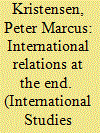

|
|
|
|
|
| Summary/Abstract |
Recent interventions suggest that the discipline of international relations has moved beyond “grand theories” and “great debates” toward middle range theorizing and quantitative hypothesis testing. At the same time, scholars argue that the field is fragmenting into insular camps. I subject these claims to an analysis that borrows from scholarship on the sociology of science. I apply network analytical methods to dissect the structure of the discipline: its dominant camps, the relationship among them, and their relative role in the discipline. I identify several citation camps, primarily delineated by theory, but also methods and subfields. The realist, liberal institutionalist, and constructivist camps continue to occupy a central role in the field. All three “isms” are identifiable as separate communities. But they are also more closely intertwined and cross-contaminated than the fragmentation thesis suggests. At the margins of the isms, connecting via constructivism, we find three theoretical camps: post-structuralism, English School, and neo-Marxist critical theory. Separate from the theoretical region, we find two camps of formal modeling, methods, and quantitative studies of inter- and intra-state conflict. The most-cited works in the field include both those engaged in grand theorization and quantitative hypothesis testing, but it is still the theoretical camps, the three isms in particular, that give international relations its distinctive sociological structure.
|
|
|
|
|
|
|
|
|
|
|
|
|
|
|
|
| 8 |
ID:
160577


|
|
|
|
|
| Summary/Abstract |
How do leaders’ statements about conflict duration affect public support for their handling of war? We build on two disparate strands of prior research to theorize how approval depends on perceptions of both war's expected value and of the leader themself. The information available for making these evaluations changes over time. The public relies on elite cues in early stages of war. Cues predicting a short conflict mobilize support. As conflict unfolds, the actual conditions provide information about the accuracy of earlier statements, while subsequent messages provide information about the consistency of these statements. Both allow the public to learn about the leader. Inaccuracy and inconsistency negatively affect evaluations of the leader and reduce support for war. Using a panel survey experiment to test these predictions, we find that public approval is highest when (1) the leader initially predicts a short conflict and (2) when initial predictions prove accurate. The results reveal an intertemporal tradeoff for leaders. Predicting a short conflict is optimal for mobilizing support but potentially suboptimal for retaining that support.
|
|
|
|
|
|
|
|
|
|
|
|
|
|
|
|
| 9 |
ID:
160572
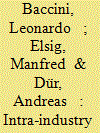

|
|
|
|
|
| Summary/Abstract |
This research note presents a new dataset on the speed of tariff liberalization in sixty-one preferential trade agreements (PTAs) signed by fifty states and regional economic organizations over the period 1995 to 2013. We use this dataset to test prominent arguments concerning the impact of intra-industry trade and global value chains on the political economy of trade. Our results indicate that the speed of tariff liberalization through PTAs is considerably faster for intermediate goods than for finished products. This is in line with the most prominent argument about how global value chains affect the political economy of trade liberalization. At the same time, we find mixed evidence for the impact of intra-industry trade on the ease of trade liberalization, which reflects strong cross-country variation. We conclude with a discussion on how the dataset can help tackle important questions in international political economy and inform ongoing debates on trade agreements.
|
|
|
|
|
|
|
|
|
|
|
|
|
|
|
|
| 10 |
ID:
160576
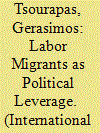

|
|
|
|
|
| Summary/Abstract |
How do states attempt to use their position as destinations for labor migration to influence sending states, and under what conditions do they succeed? I argue that economically driven cross-border mobility generates reciprocal political economy effects on sending and host states. That is, it produces migration interdependence. Host states may leverage their position against a sending state by either deploying strategies of restriction—curbing remittances, strengthening immigration controls, or both—or displacement—forcefully expelling citizens of the sending state. These strategies’ success depends on whether the sending state is vulnerable to the political economy costs incurred by host states’ strategy, namely if it is unable to absorb them domestically and cannot procure the support of alternative host states. I also contend that displacement strategies involve higher costs than restriction efforts and are therefore more likely to succeed. I demonstrate my claims through a least-likely, two-case study design of Libyan and Jordanian coercive migration diplomacy against Egypt in the aftermath of the Arab Spring. I examine how two weaker Arab states leveraged their position against Egypt, a stronger state but one vulnerable to migration interdependence, through the restriction and displacement of Egyptian migrants.
|
|
|
|
|
|
|
|
|
|
|
|
|
|
|
|
| 11 |
ID:
160570
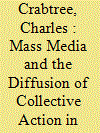

|
|
|
|
|
| Summary/Abstract |
A growing literature attributes the rapid diffusion of domestic collective mobilization against authoritarian regimes to foreign mass media broadcasts. We examine this relationship in the context of the June 17, 1953, uprising in East Germany, the first national rebellion against communist rule in Eastern Europe. The uprising involved an extraordinarily swift and wide-ranging diffusion of antiregime collective action. Observers on both sides of the Iron Curtain attributed the revolt to Western media broadcasts, particularly news broadcasts by the Radio in the American Sector (RIAS) of Berlin. While historians have strongly endorsed this view, social scientists have never quantitatively tested it. We investigate the potential relationship between municipality-level protest events and RIAS broadcasts by exploiting plausibly exogenous variation in RIAS signal strength across East Germany. We find no evidence to support the hypothesis that RIAS caused the diffusion of protest during the uprising. Instead, our results suggest that social ties likely played an important, and underrecognized, role in the swift diffusion of antiregime collective action.
|
|
|
|
|
|
|
|
|
|
|
|
|
|
|
|
| 12 |
ID:
160573
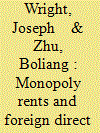

|
|
|
|
|
| Summary/Abstract |
In the past two decades, much of foreign direct investment (FDI) in the primary sector has flowed to unconventional, politically risky destinations. This presents a puzzle for theories that emphasize the ex post immobility of—and hence high potential expropriation risk for—fixed asset investment. Existing theories overlook one critical aspect of fixed assets: large capital requirements and high sunk costs act as entry barriers, resulting in market concentration and strong firm incentive for monopoly rent extraction. Personalist dictatorships, we posit, provide an attractive institutional environment for fixed asset investors. In such systems, the control of key economic sectors by the families of leaders, combined with a lack of institutional constraints, facilitate rent-seeking activities. We find that personalist dictatorships receive significantly more foreign investment in the primary sector, and fixed-asset intensive industries in general, than other regimes. This study highlights the importance of accounting for heterogeneity among investors and political regimes to understand the politics of FDI.
|
|
|
|
|
|
|
|
|
|
|
|
|
|
|
|
| 13 |
ID:
160574


|
|
|
|
|
| Summary/Abstract |
Countries use economic sanctions as a way to force their opponents to make policy concessions. Such external pressure may, as the designers of sanctions often intend, affect the degree of domestic support for the target's political leaders. It may even threaten the leaders’ survival in office. We investigate how these dual pressures—preference for policy concessions and concern about target leaders’ political future—shape the use of sanctions in the context of political relations between the sanctioning and sanctioned countries. The political relations between the two countries matter because a decline in the likelihood of the target leader's political survival results in a cost for the sanctioner when the target is a friendly regime and generates a benefit when the targeted regime is an adversary. Therefore, we argue, and show statistically, that economic coercion is more likely for friendly governments when they are politically stable and unfriendly governments when they are politically vulnerable. We illustrate our causal mechanism using declassified primary sources for two case studies of US sanctions against Chile.
|
|
|
|
|
|
|
|
|
|
|
|
|
|
|
|
| 14 |
ID:
160579


|
|
|
|
|
| Summary/Abstract |
When American Anglican and Lutheran churches elected to ordain same-sex partnered clergy, nearly all African counterparts either denounced LGBTQ inclusion or entirely dissociated from their bilateral partners. Why did these disagreements over domestic policies introduce transnational schisms, and what explains this variation? I argue that East African churches responded to bilateral partners’ LGBTQ inclusion by adopting a strategy of symbolic resistance. They invoked domestic anticolonial sentiments to buttress their symbolic capital, relative to domestic religious competitors. Churches who relied least on US counterparts (financially or institutionally) fortified that resistance by dissociating entirely. All others maintained bilateral partnerships but publicly denounced LGBTQ inclusion. This research contributes insights about transnational norm diffusion. Beyond simply dismissing norms deemed incongruent with domestic ideals, actors in the global South capitalize on incongruence to gain domestic symbolic capital. Global rights movements thereby unwittingly incentivize domestic actors to mobilize a strategy of symbolic resistance that obstructs transnational agendas.
|
|
|
|
|
|
|
|
|
|
|
|
|
|
|
|
| 15 |
ID:
160580


|
|
|
|
|
| Summary/Abstract |
Why do intergovernmental organizations target some countries, but not others, for naming and shaming? We seek answers by examining these processes within the International Labour Organization (ILO), which through two principal bodies, monitors compliance with international conventions governing the rights of workers. We examine whether political interests and calculations or norms inducing adherence to international conventions best explain which countries the ILO calls out for their misconduct, what punishment countries receive, and whether naming and shaming in the ILO amount to distinctive activities. Based on an analysis of the 1989–2011 period, we find considerable evidence that norms matter to members of both ILO bodies. That is, we find evidence that the ILO “does its job” by acting in accordance with the organization's formal mandate. We also find evidence that the process of naming, which leads to the initial identification of culprits, stands apart from the process by which the ILO prioritizes, or chooses, from among countries for shaming. While our findings are specific to the ILO, they back claims that IOs can override states interests, if crafted in ways that limit political influence.
|
|
|
|
|
|
|
|
|
|
|
|
|
|
|
|
| 16 |
ID:
160568


|
|
|
|
|
| Summary/Abstract |
Scholars frequently use country-level indicators such as gross domestic product, bureaucratic quality, and military spending to approximate state capacity. These factors capture the aggregate level of state capacity, but do not adequately approximate the actual distribution of capacity within states. This presents a major problem, as intrastate variations in state capacity provide crucial information for understanding the relationship between state capacity and civil war. We offer nighttime light emissions as a measure of state capacity. It allows us to differentiate the influence of local variation on the outbreak of civil wars within the country from the effect of aggregate state capacity at the country level. We articulate pathways linking the distribution of nighttime light with the expansion of state capacity and validate our indicator against other measures at different levels of disaggregation across multiple contexts. Contrary to conventional wisdom, we find that civil wars are more likely to erupt where the state exercises more control. We provide three mechanisms that, we believe, account for this counterintuitive finding: rebel gravitation, elite fragmentation, and expansion reaction. In the first scenario, state presence attracts insurgent activities. In the second, insurgents emerge as a result of the fragmentation of political elites. In the third, antistate groups react violently to the state penetrating into a given territory. Finally, we validate these mechanisms using evidence from Sub-Saharan Africa.
|
|
|
|
|
|
|
|
|
|
|
|
|
|
|
|
| 17 |
ID:
160578


|
|
|
|
|
| Summary/Abstract |
Scholars, practitioners, and pundits often leave their assessments of uncertainty vague when debating foreign policy, arguing that clearer probability estimates would provide arbitrary detail instead of useful insight. We provide the first systematic test of this claim using a data set containing 888,328 geopolitical forecasts. We find that coarsening numeric probability assessments in a manner consistent with common qualitative expressions—including expressions currently recommended for use by intelligence analysts—consistently sacrifices predictive accuracy. This finding does not depend on extreme probability estimates, short time horizons, particular scoring rules, or individual attributes that are difficult to cultivate. At a practical level, our analysis indicates that it would be possible to make foreign policy discourse more informative by supplementing natural language-based descriptions of uncertainty with quantitative probability estimates. More broadly, our findings advance long-standing debates over the nature and limits of subjective judgment when assessing social phenomena, showing how explicit probability assessments are empirically justifiable even in domains as complex as world politics.
|
|
|
|
|
|
|
|
|
|
|
|
|
|
|
|
| 18 |
ID:
160565


|
|
|
|
|
| Summary/Abstract |
Why is there no reactionary international theory? International relations has long drawn on a range of traditions in political thought. However, no current, or even recent, major school of international-relations theory embraces reactionary doctrine. This is more surprising than some might assume. Reaction was once common in the field and is now increasingly common in world politics. In this note, we define reaction and show that no active and influential school of international-relations theory falls within its ideological domain. Nonetheless, reactionary ideas once deeply shaped the field. We identify two distinct kinds of reactionary international politics and illustrate them empirically. We argue that the current lack of reactionary international relations undermines the field's ability to make sense both of its own history and of reactionary practice. Finally, we offer some preliminary thoughts about why reactionary ideas hold little sway in contemporary international-relations theory.
|
|
|
|
|
|
|
|
|
|
|
|
|
|
|
|
|
|
|
|
|